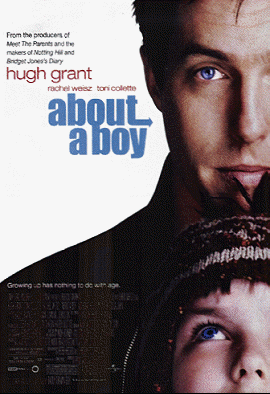
ABOUT A BOY (2002) |
| Starring Hugh Grant, Rachel Weisz,
Toni Collette, Nicholas Hoult, Sharon Small, Nicholas
Hutchison, Nat Gastiain Tena and Isabel Brook.
Screenplay by Nick Hornby & Peter Hedges.
Directed by Chris Weitz & Paul Weitz.
Distributed by Universal Pictures.
Rated PG-13. 102 minutes. |
 
 |
About A Boy
Hugh Grant has
quietly, subtly become one of our best light comic actors. Maybe because he is best
known for playing similar characters – handsome and charming yet flustered and shy
– in his two biggest films, Four Weddings and a Funeral and Notting Hill
people have a tendency to overlook his range.
About A Boy is based on the
wonderful novel of Nick Hornby, who also wrote High Fidelity, which John Cusack
turned into another terrific look at modern single life. Grant gets an another
opportunity to really stretch his acting muscles in the story, and he makes the best of
it. Will Freeman is the dark side of Grant’s persona, handsome and charming,
yet selfish and a rogue. A man who has reached his forties without ever holding a
job or having a serious relationship, Will is happy just to stay around, watch TV, and bed
an endless stream of women before quickly bailing on them. His economic independence
is due to his father having written a stupid Christmas ditty years earlier, a song that
has become so ubiquitous that Will has come to despise the very thing which allows his
lifestyle.
Will stumbles upon a new scam to meet women, and soon he is going to single
parent support groups to meet mothers who will be needy and yet in the long run
unavailable. The plan is working brilliantly until he meets an odd boy named Marcus
through one of his dates. Marcus is tortured, both by fellow school kids and by
guilt over his manic-depressive hippie mother (Toni Collette). Marcus suddenly
starts just showing up at Will’s place, and since Will has nothing better to do he
decides to make a project of helping Marcus.
Their friendship blossoms and allows
Will to open up enough to meet a woman he can seriously care about rather than making
tracks as soon as commitment pops its head in. The one problem I have with the movie
(and the novel, for that matter)… and it is the same thing that made High
Fidelity’s ending a little anticlimactic… is that Hornby is wonderful at
portraying single life, but in the end he has to toe the "family values" line,
so his characters always decide they are not whole until they are married and have
families. But that is a slight quibble in an otherwise delightful film. (5/02)
Jay S. Jacobs
Copyright
© 2002 PopEntertainment.com All rights reserved.
Posted November 16, 2002.
 |
RETURN
TO MOVIE REVIEWS MENU
 
Copyright
© 2002 PopEntertainment.com All rights reserved.
Posted November 16, 2002. |